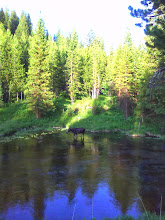First of all, I need to say that I have done no hard research on this topic.
Second, I need to say that I am making no moral judgement on Disney. "I like Disney" is the extent of my moral judgement.
Third, I would like to say that I think this would be a very productive avenue of research. I am only musing. If someone wants to offer me--an overqualified muser--an enormous grant to research this avenue further, I might take it, but I'd have to think about it first.
Having provided those disclaimers, I'll begin.
Disney released its fifth feature-length animated film, Bambi, in the summer of 1942 (that would make an interesting title for a book, wouldn't it? The Summer of '42--oh, wait, scratch that). I attended a re-release of Bambi in the 1960's that had a profound influence on me. After I saw the film, though I had grown up in a home and in the midst of a culture that revolved around the deer season, I could not bring myself to seriously hunt deer.
I do not object to hunting, and I love the taste of venison. Furthermore, my unwillingness to take a gun and go blasting away at Bambi's mother is born as much from my inability to see clearly (and the fear that I might blast my own father, let alone an errant doe) as it is the trauma of reliving this most traumatic childhood movie.
But I have wondered how many other people were influenced as I was by the film, and I've noticed a few correlations that may or may not be related.
The first modern federal gun control legislation (The Gun Control Act of 1968) was passed just two years after the US re-release of Bambi. PETA (People for the Ethical Treatment of Animals) was founded in 1980, five years after a 1975 US re-release. Vegetarianism in the United States is said to have begun to become popular with the publication of Frances Moore Lappe's 1971 book, Diet for a Small Planet.
Of course, this may all be post-hoc ergo propter-hoc fallacy, but I suspect that there is at the very least a lurking guilt for the death of Bambi's mom in all of these things.
AFI lists "man" in Bambi as one of the worst film villains of all time.
I'm not suggesting at all that Disney consciously intended to propagandize against hunting. I think Walt found a good story that children would love, and he adapted it brilliantly. (I personally think the film is better than Felix Salten's book, or at least I did when I read the book in the sixth grade.) But there is no denying that the film is powerful and formative.
Why? Apart from the Disney skills at work, the film is addressed to children.
And that is something that interests me a lot.
Sunday, February 2, 2014
Disney and the teaching of America's children
Subscribe to:
Post Comments (Atom)

No comments:
Post a Comment